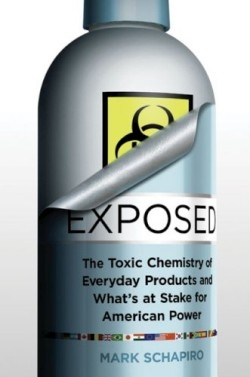Exposed
The Toxic Chemistry of Everyday ProductsWhos At Risk and Whats At Stake for American Power
Cosmetics, computers, cell phones—these are the accoutrements of modern American life. As it turns out, many of these items are also laden with chemicals potentially so toxic that several countries around the world, notably in the European Union, have taken regulatory steps to ban them. In this smart and timely new book, Mark Schapiro, editorial director of the Center for Investigative Reporting, examines the widening gap between American and EU chemical and environmental regulation, cogently arguing that although the United States used to be a leader in environmental protection, the power has shifted across the Atlantic.
Plastic-softening phthalates, pesticides, and potentially carcinogenic ingredients in cosmetics are just some of the chemicals that have found themselves regulated by the international community in recent years. The good news is that when it comes to some chemicals (like those found in electronics), Americans are frequently benefiting blindly as products re-engineered to comply with the E.U.’s higher standards find their way onto the shelves of American stores. The bad news is that in many other cases (like cosmetics), companies are operating with a double standard and selling Americans potentially toxic products from which their European peers are shielded.
At the heart of the separation between the U.S. and the E.U. is a different understanding of risk. While the American approach dictates that a chemical is safe unless conclusively proven dangerous, the E.U.’s approach is modeled on the precautionary principle, whereby a product is kept off the market if its potential to harm outweighs its perceived benefit.
Consider the Basel Convention, which prohibits developed countries from exporting hazardous waste to developing countries; by 2006, the convention had been ratified by 166 nations, the U.S. not among them. The E.U., Japan, Norway, Argentina, and Mexico have all issued bans against certain phthalates (thought to result in the “feminization of infant boys”) from infant toys; again, the U.S. is one of the only developed nations to lack government limits. Further, there are possible economic consequences: refusing to sign the Kyoto accord is shifting business opportunities from U.S. to European innovators. Strikingly, states, including California, Massachusetts, Maryland, and New York, have recently attempted to step into this regulatory gap and craft their own legislation.
“Power has shifted,” Schapiro concludes. “American citizens are being put in a position that would have been unimaginable a decade ago: in some instances a dumping ground for goods not wanted elsewhere in the world, in other instances the accidental beneficiaries of protective standards created by another government over which they have no influence.” Either way, the United States is being left behind and Exposed makes a persuasive and informed case that the only solution is to raise the national bar when it comes to environmental regulation.
Reviewed by
Erica Wetter
Disclosure: This article is not an endorsement, but a review. The publisher of this book provided free copies of the book to have their book reviewed by a professional reviewer. No fee was paid by the publisher for this review. Foreword Reviews only recommends books that we love. Foreword Magazine, Inc. is disclosing this in accordance with the Federal Trade Commission’s 16 CFR, Part 255.

